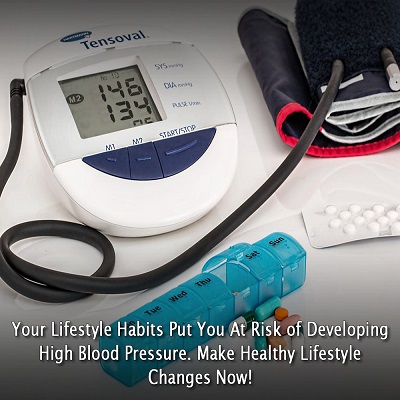 Blood pressure is essential for the arteries to carry blood throughout the body. It rises and falls throughout the day, depending on what activity you’re doing. However, persistently high blood pressure levels lead to hypertension, which increases the risk of having a heart attack and stroke.
Blood pressure is essential for the arteries to carry blood throughout the body. It rises and falls throughout the day, depending on what activity you’re doing. However, persistently high blood pressure levels lead to hypertension, which increases the risk of having a heart attack and stroke.
Hypertension develops over time and usually has no symptoms, making it even more dangerous. Hypertension often occurs due to unhealthy lifestyle choices, diabetes, and obesity. When you have high blood pressure, your heart, kidneys, eyes, brain, and other organs are at risk of damage.
The positive side to this problem is that you can make changes in your life, to help control your blood pressure and maintain it at a normal level. Here are some steps to start doing that right now:
Manage Your Weight by Eating Healthy & Getting Active
If you like take-out foods and processed foods, it’s time to cut back on them, if not eliminate them totally. Don’t binge on junk foods. Instead, start eating a healthy diet, focusing on whole foods, fruits, and vegetables.
Sugar and refined carbohydrates are significant factors that can make you overweight. So, cutting down on them can help you lose weight and manage your blood pressure level. Switch to low-carb and low-sugar foods and eat more protein-rich foods and healthy fats. That will make you feel fuller, so you ultimately eat less.
You should exercise regularly to lower your blood pressure. Experts recommend aerobic exercises, such as brisk walking, cycling, jogging, dancing, and swimming. Spend at least 30 minutes a day, five times a week.
Obesity is one of the leading causes of hypertension, so it’s important to lose any excess weight. Pay attention to the extra fat accumulating around your waistline because that makes you even more prone to high blood pressure.
Change Your Habits – Watch Your Caffeine & Alcohol Intake and Quit Smoking
Avoid drinking alcohol as alcohol raises your blood pressure. You must keep your alcohol intake at a minimum. The maximum recommendation is two drinks for men and one for women per day.
You may love having a couple of cups of coffee throughout the day, but if you have hypertension, try to cut down on your caffeine intake. Caffeine can also interrupt your sleep, which can further increase your blood pressure.
Cigarette smoking can increase your blood pressure and your risk of heart disease or stroke. Smoking leads to plaque buildup in the arteries, which causes blood pressure to increase.
Reduce Sodium and Increase Potassium
Cut back on foods that are high in sodium because it can elevate your blood pressure. So, keep your heart healthy by reducing salt in your diet. Read food labels and, as much as possible, find alternatives with low sodium content. Better yet, stick to natural foods instead of processed ones, which have added salt for preservation as well as taste.
Eat foods that are rich in potassium as it helps ease tension in the blood vessels. It can also lessen the effects of sodium in the body.
Reduce Your Stress and Get Enough Sleep
Stress is a major cause of hypertension, so it’s crucial to manage your stress levels. Think of what your stress triggers are and try to minimize their impact on you if you can’t eliminate them entirely. Do activities that relax you and get a good night’s sleep. Your blood pressure decreases during sleep, so when you don’t get enough sleep, it remains persistently high. Set a regular sleep schedule and destress during the day.
Set Your Goals & Track Your Progress
Lifestyle is the biggest factor that puts you at a high risk of high blood pressure. It’s not easy to change your lifestyle habits. They won’t all change overnight. Start by setting small goals. Understand why you have to make the changes. Make sure that you track your progress and monitor your blood pressure. You may also seek the support of your family and friends and ask them to keep you accountable so that you’ll reach your goals faster!






